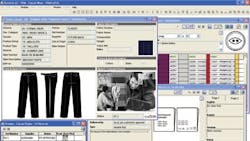Gerber Technology and Infor recently introduced the latest versions of their product lifecycle management (PLM) solutions for the apparel and textile industry. Conformia has set its PLM sights on the life sciences and alcohol beverages industries. And Enovia's Life Sciences Accelerator for Engineering Design delivers a solution for the medical devices community.
If it seems as though more industry-specific PLM solutions are finding their way to market, that's because there are. It's a definite trend, says Peter A. Bilello, vice president at CIMdata, a PLM consulting firm, that is both natural evolution as well as reflective of the maturing of the PLM industry.
About 10 years ago there was a push toward industry-specific solutions, Bilello notes. Attention then shifted to strengthening the generic applications, incorporating best practices, and now focus is returning to specialized solutions. "It's come back around; it's the next logical step," he says. And it's both large players and niche providers that are starting again to build out for specific industries.
For example, Siemens PLM Software, which already has a number of industry-specific solutions, earlier this year shared with media and analysts a sneak peak at Teamcenter 8. This solution will include substantial functionality for the process industry, the company says, including formulation and recipe management.
Ultimately, the industry-specific solutions can be easier to sell, especially to the midmarket, which is looking for off-the-shelf options, Bilello says.
Even with the increased focus on specific industries, there are plenty of untapped industry-sector opportunities for PLM, explains Bilello. They include facilities, utilities, ports and airports, and fleet management.
See Also
About the Author
Jill Jusko
Bio: Jill Jusko is executive editor for IndustryWeek. She has been writing about manufacturing operations leadership for more than 20 years. Her coverage spotlights companies that are in pursuit of world-class results in quality, productivity, cost and other benchmarks by implementing the latest continuous improvement and lean/Six-Sigma strategies. Jill also coordinates IndustryWeek’s Best Plants Awards Program, which annually salutes the leading manufacturing facilities in North America.
Have a story idea? Send it to [email protected].

